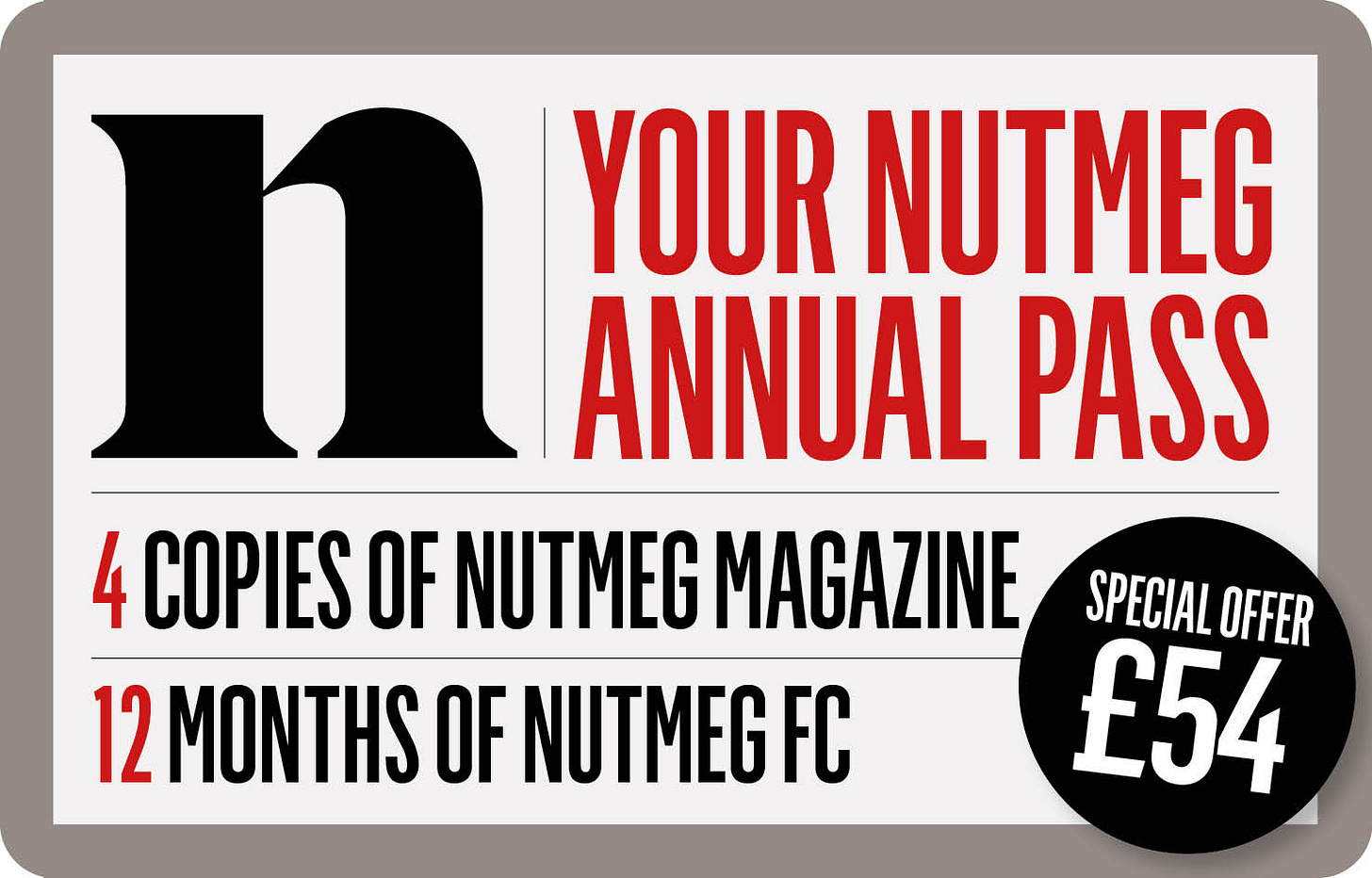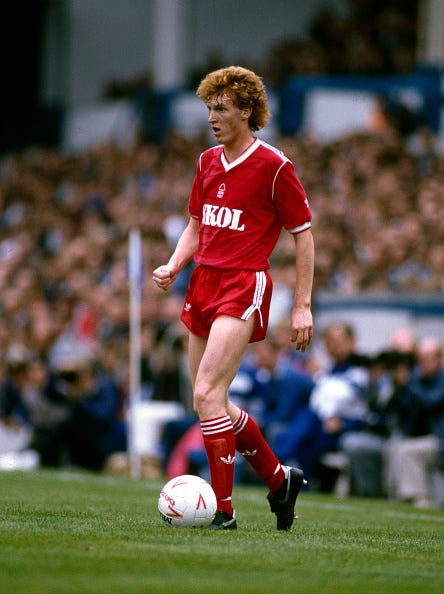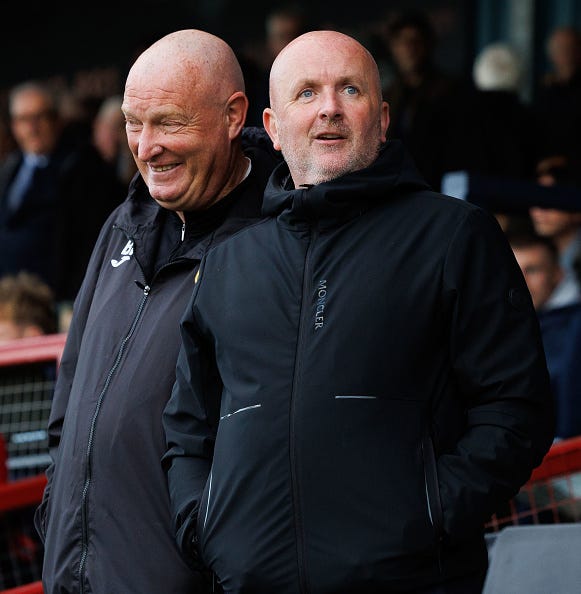ADDICTED TO GAMBLING #1: 🗣️ ‘I held my hands up — but should you punish someone for an illness?’
Scottish football is hooked on bookie sponsorship, but the compulsion to gamble afflicts many participants. Brian Rice hit rock bottom…
Award-winning sportswriter Stephen McGowan writes monthly investigations for Nutmeg FC. This week, he examines how gambling addiction blights the lives of a shockingly high number of people involved in our national sport. Today, we hear from Livingston head of football operations Brian Rice.
🗣️ Tomorrow: Part II — Tranent chairman Brian Johnston reveals how he lost £1million as an addict and how it took him decades to change his life.
🗣️ Wednesday: Part III — We hear from those who think betting firm advertising is out of control and ask: if safe gambling a realistic goal?
This article is free, but parts II and III, like most of our content, are paid. Don’t miss out… get a Nutmeg season ticket. Sign up and get 12 months of access PLUS a year’s subscription to the beautiful, 200-page print quarterly — delivered straight to your door.
By Stephen McGowan
Four or five nights a week, Brian Rice crosses the country, clocking up miles in his car, taking in a game of football.
For Livingston’s head of football operations, it’s not just a labour of love. Casting an eye over players is what he does. As Roy Keane might say, it’s his job.
In the age of digital media, there’s no need to be perched in a stand in the middle of winter barking notes into a Dictaphone. Between wall-to-wall live football on television and Wyscout, he could watch games from the comfort of his armchair.
No fan of Coronation Street, he prefers to wrap up warm and cover the length of the British Isles night after night for one simple reason: it’s a habit he can’t break.
“Everything I do is to excess,” Rice tells Nutmeg FC. “Even when I played as a kid at Hibs, I used to go to games all the time.
“If the choice was sitting in the house at night watching games on TV or physically going to games there is no choice for me. I love watching games. I just love watching football.
“My kids are grown up now, but even when they were young, football came first every time. The game is an addiction and I should know all about addiction….”
At the age of 61, Rice retains an extraordinary memory for dates. During a short break in Tenerife, he realised that the trip coincided with the 40th anniversary of his first goal for Brian Clough’s Nottingham Forest — a 3-0 win over Leicester City on September 3, 1985.
The events of January 30, 2020 are etched equally clearly in his mind. Manager of Hamilton Academical at the time, he was handed a ten-match ban by the Scottish Football Association for betting on football matches. Summoned to attend an independent disciplinary tribunal, he pled guilty.
“I remember sitting there feeling embarrassed, feeling ashamed. I was a compulsive gambler and I had broken the rules. I had let my club down, I had let my family down.
“They told me the charges and I said, ‘Yeah, that’s all right.’
“But then I asked if I could tell them something. I told them that I was powerless when it came to gambling. I have an illness and I didn’t know why I gambled like I did.
“I denied nothing and they gave me a ten-game ban. I understand why they gave me it. But they were both right to punish me and wrong to punish me. Yes, I broke the rules, but do you punish someone with an addiction? I don’t know.
“I accepted the punishment, I was guilty. But I don’t think we should be punishing people with an addiction. We should be trying to help them.”
Scottish football’s relationship with betting firms is both complex and contradictory.
While the SFA apply a strict, worldwide ban on registered participants (players, coaches or officials) gambling on football, the national game leans heavily on commercial revenue from the same source.
In the summer of 2024, the Scottish Professional Football League agreed a record five-year title-naming deal with bookmakers William Hill worth £2million per annum.
Stats Perform pay the same sum every year for the right to distribute live audiovisual streams of the Scottish Premiership and SWPL as well as key games from the Scottish Championship and League One to overseas sports betting operators.
In return for the data sold to betting companies through Football Data Co, meanwhile, the SPFL rakes in the not insignificant sum of £5m a year. Add in revenue earned by the SFA and sources on Hampden’s sixth floor believe that Scottish football profits to the tune of around £10m a year from commercial tie-ups with betting firms. Roughly 25% of the prize pot distributed to clubs comes from gambling.
Of the 12 clubs in Scotland’s top flight, meanwhile, three are sponsored by betting firms. Champions Celtic are backed by Dafabet, an online betting and casino operator. Dundee United are sponsored by Quinn Casino, a platform operated by QuinnBet. Rangers bear the name of Unibet, a prominent betting brand, on the front of their shirt.
Scotland is but the tip of the iceberg. Investigate Europe, a cross-border team of reporters, editors and producers published a report earlier this year showing just how far gambling’s influence extends across the continent.
Almost half of the leagues in Europe, including Austria, Greece and Czechia rely on a bookmaker or lottery title sponsor, while almost 300 top-flight clubs have deals with betting firms.
In 31 competitions across the European Union and UK two thirds of teams — 296 out of 442 — were signed up with an official betting partner last season. One in three had a front-of-shirt sponsor.
While the English Premier League has agreed to introduce a voluntary ban on front-of-shirt sponsors from next season, clubs will still carry logos on their sleeves, shorts and training kits.
Attempts to curtail restrictions on shirt advertising in Belgium and Italy, meanwhile, have been met with cunning. Clubs now promote the betting brands’ news/entertainment or charitable logos on kits instead.
“It’s a Catch-22,” says Rice. “We need the money, but we don’t need the carnage which can come of it.
“I have said on numerous occasions that football in Scotland needs the finance betting brings in. It needs support and sponsorship and it just so happens that a lot of that money comes from the gambling industry.
“I welcome that from a monetary perspective. I don’t welcome it from the other perspective of the compulsive gambler. I think 95% of people will see the advertising and not think anything. It’s the 5% with addictive personalities we need to worry about.”
Rice’s personality was more addictive than most. Over 40 minutes in an upstairs lounge of Livingston’s Set Fare Arena his eyes moisten three or four times as he winds the clock back to his darkest days. At the height of his gambling, he faced jail in Qatar over a £65,000 debt and remembers feeling drained of empathy or interest in the lives of others, his own family included. His thoughts focussed on the next bet, he could be physically present in a room and mentally absent at the same time.
“I get emotional talking about it. Probably because I remember where it took me. When you are a gambler, you don’t get emotional about anything. You are so wrapped up in what you are doing.
“Gambling consumes you. It’s not just the money you lose, it’s time with your family that you never get back. That was a massive thing — I was losing family time through football and gambling.
“Even when I was there, I was actually elsewhere; I was never present. It was always not going to nights out, parties, weddings or funerals. It was always, ‘You all go, isolate me.’”
“I couldn’t get my head round the idea of gambling as an illness until I saw a sign in Tesco one day. There were three toilets for male, female and disabilities. And above that door was a sign saying, ‘Not all disabilities are visible.’
“And I thought, ‘I wonder if that’s the same with illnesses?’ If you have the illness we are talking about, no one sees it.”
Over the course of this three-part investigation, Nutmeg FC will outline how seriously the nation’s politicians take the issue of problem gambling while exploring the measures betting firms are taking to promote safe betting from both athletes and spectators. Teaming up with William Hill and the SPFL, EPIC Global Solutions — experts in gambling harm prevention — have already gone into 37 Scottish clubs to deliver workshops and education to players.
PFA Scotland, the players’ union, have also teamed up with Sporting Chance, a therapy group for retired athletes, to set up a 24/7 helpline. Where gambling addiction has always been a silent, furtive illness, people are now encouraged to speak about their problems. Rice tells his story because he, too, wants to help younger players avoid the mistakes he made.
“I’ve worked with lots of players but too many think it’s a quick fix. That if they just stop betting for a month, things will be alright.
“The crux is to stop and to stay stopped. If you don’t change the person you are or change your habits, you go back to the person you were before.
“I’ve had to change everything in my life. My routine, my friends, the route I take home. I used to go a three-mile detour because there were two bookies on the route.
“The hardest thing is asking for help. I grew up in an age when if you asked for help it was a sign of weakness. You were expected to man up and give yourself a shake. Whereas now I see it as a strength. Whether it’s mental health, physical issues or gambling, it’s okay to ask. I want people to know that I’m here. Pick up the phone or write me a letter.
“PFA Scotland and EPIC do fantastic things now. They go round all the clubs and when they came here one of the players came to me ten days later and asked me if I could help him out. That’s what the game needs to tackle this, because gambling in football is rife.”




